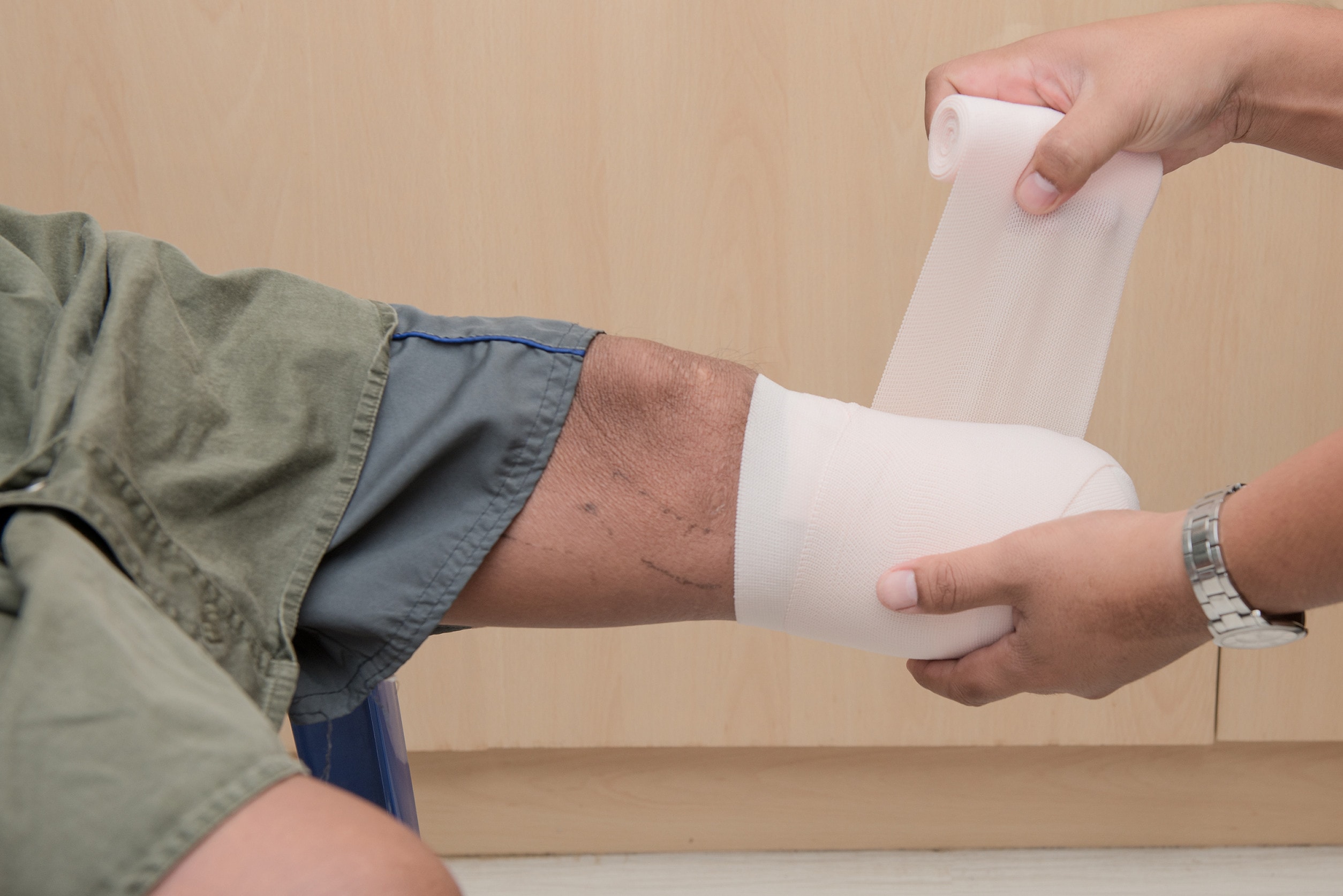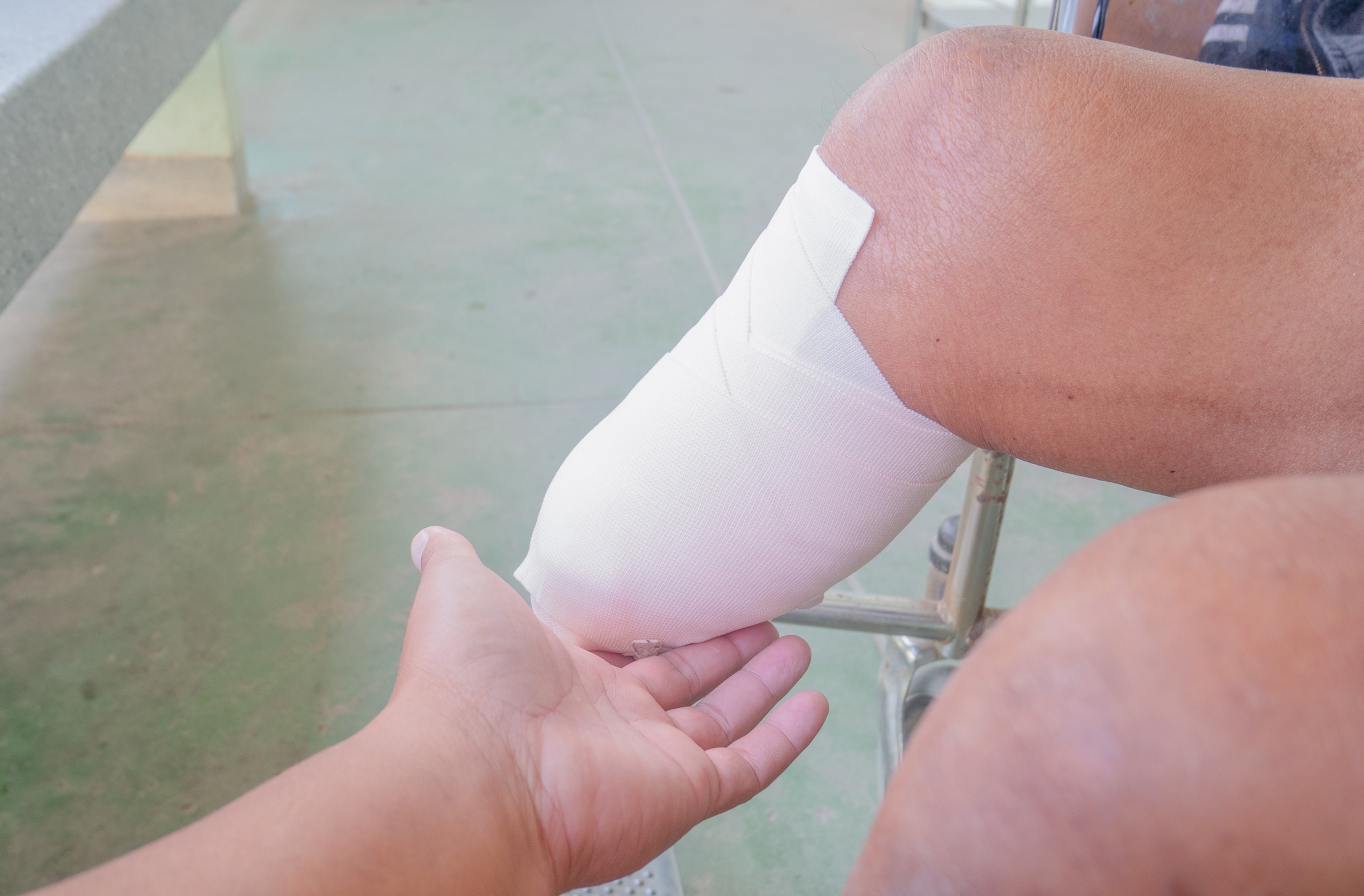Losing a leg either traumatically in an accident or surgically following an accident due to the extent of your injuries can be devasting. You may be unable to participate in previous hobbies or return to work, leading to emotional distress and financial losses. Therefore, you may be wondering, ‘How much compensation for losing a leg could I claim?’. In this guide, we discuss when you could make a claim for personal injury compensation.
Key Takeaways In Leg Amputation Claims
- Your compensation can depend on the placement of the amputation, the success of prosthetics, and psychological effects
- If you can prove that you lost your leg as a result of the negligent actions of another, then you may be able to make a personal injury claim
- Losing a leg can have a severe mental, physical, and financial impact
- You could potentially make a claim on someone else’s behalf by acting as a litigation friend
- A No Win No Fee solicitor could help you make a leg amputation claim
Keep reading to learn more, or get in touch with a member of our helpful team to get started by:
- Calling us on 0800 073 8804
- Using the live chat feature
- Contacting us online
Select A Section
- How Much Compensation For Losing A Leg?
- Who Can Make Leg Amputation Claims?
- How Could Someone Lose A Leg?
- The Impacts Of Leg Amputation
- Claiming On Behalf Of Someone Else
- Why Work With Legal Expert On Your Claim?
- More Information
How Much Compensation For Losing A Leg?
A common question that we receive is, “How much compensation could I get for losing a leg?” This can be a difficult question to answer, because the amount that you could receive is affected by factors such as:
- How much evidence you have to support your claim
- The level of amputation and disability
- Whether you have success with prosthetics
- Whether the other party accepts liability for your injuries
- The way your injury has affected you financially
Because these circumstances can determine how much you receive, every payout is different. But all successful claims will result in general damages. This is one of two different types of compensation that come together to form your final payout.
General damages address the pain and suffering caused by your injuries, as well as loss of amenity. This means it takes into account the way the amputation has affected your ability to enjoy your life and hobbies.
When professionals value this head of your claim, they might use the Judicial College Guidelines (JCG), which is a document that contains a list of injuries and illnesses, including leg amputations, alongside guideline brackets of compensation.
In the list below, you can find some examples of these brackets that could be relevant to a leg amputation claim. However, please be aware that these are not guaranteed, and that the first entry is not from the JCG.
- Multiple severe injuries with special damages – for financial losses such as lost earnings and medical costs – Up to £1,00,000+
- Loss of both Legs – either both lost above the knee or one above and one below – £292,850 to £344,150
- Below-knee amputation of both legs – factors such as associated psychological issues and phantom pains will impact the amount awarded – £245,900 to £329,620
- Above-knee amputation of one leg – the level of amputation and any issues with the remaining stump will impact the compensation awarded – £127,930 to £167,760
- Below-knee amputation of one leg – traumatic amputations from an accident are applicable to the higher end of this bracket – £119,570 to £162,290
- Severe psychiatric damage – the prognosis, future vulnerability and effect on relationships will be taken into consideration – £66,920 to £141,240
- Severe Post-traumatic stress disorder – permanent effects will prevent the person from functioning as they did pre-trauma – £73,050 to £122,850
Special Damages
Special damages are the second type of compensation that you could potentially receive. Losing a leg can have a significant impact on your finances, from paying for prosthetics to the cost of future medical treatments.
In some cases, you may able to claim these losses back under special damages, as well as the cost of:
- Childcare
- Lost wages
- Prescriptions
- Home adjustments
- Mobility aids
- Counselling
Evidence needs to be provided to be able to claim special damage for these costs. This could include payslips, invoices and bank statements.
To learn more about how much compensation for losing a leg you could potentially receive, contact our team today.
Who Can Make Leg Amputation Claims?
Now that we have discussed how much compensation for losing a leg you could potentially receive, you need to know when you could be eligible to make leg amputation claims. To form the basis of a valid claim, you need to be able to prove that negligence has occurred. In terms of personal injury law, negligence means that:
- Someone else owed you a duty of care
- This duty was breached
- You were harmed as a result
Negligence can happen anywhere, from the workplace to a supermarket, as long as someone else owes you a duty of care. But what does this mean?
- When you’re at work, your employer owes you a duty of care. This means that they need to take all reasonably practicable steps to keep you safe, as per the Health and Safety at Work etc. Act 1974 (HASAWA).
- While in public, whoever is in control of that space owes you a duty of care. This means that they need to take all practicable steps to ensure your reasonable safety while you’re visiting the premises, as per the Occupiers’ Liability Act 1957.
- All road users owe and are owed a duty of care. This applies to anyone using the roads, and it means that they need to prevent causing harm or damage. They must also adhere to the Road Traffic Act 1988 and the Highway Code,
Keep reading to see some examples of how a duty of care could be breached. Or, to find out how much compensation for losing a leg you could receive, contact our team today.
How Could Someone Lose A Leg?
Now we’ve explained what a duty of care is, let’s look at some examples of how a breach in this duty could lead to losing a leg.
- At work: If you work with heavy machinery, it’s your employer’s responsibility to ensure that this is properly maintained. If your employer asks you to work with a piece of machinery that they know is defective or broken, and this results in you losing a leg, then you may be able to make a claim.
- In public: A balcony railing in a public shopping center is broken. Management know this, but they do not attempt to have it fixed or signpost the danger to the public. This causes a shopper to fall through it, fracturing their leg so severely it must be amputated.
- On the roads: While using a zebra crossing as a pedestrian, a car drives through a red light and hits you. This results in both of your legs being amputated.
The examples above are only a few ways in which negligence can occur. To find out if you have a valid personal injury claim, contact our team of advisors today.
The Impacts Of Leg Amputation
Losing a leg can have a severe impact on your physical and mental health, but it can also impact your finances. For example, leg amputation can lead to:
- Mental health struggles, including post-traumatic stress disorder (PTSD), anxiety, and depression
- Phantom pains
- Joint problems
- Scarring
- Out-of-pocket financial losses, for example, lost wages and the cost of prosthetic limbs
What Is An Interim Payment?
In cases where your claim has a high chance of succeeding, you may be able to apply for an interim payment. These are used to help those who have immediate expenses caused by their injuries by providing a percentage of the expected compensation upfront. Then, when the claim is resolved, the amount received as an interim payment is deducted from the final amount.
If you think you could be eligible for an interim payment, or if you’d like to learn more, get in touch with one of our advisors today.
Claiming On Behalf Of Someone Else
You might be wondering if you could make a loss of leg claim on behalf of someone else. In some cases, you may be able to claim on a loved one’s behalf as a litigation friend.
To act as a litigation friend, you need to be approved by the court. Then, it would be your responsibility to:
- Act in the claimant’s best interests
- Make all efforts to make the claimant aware of what’s happening, and find out how they feel about the proceedings
- Communicate with and work with their solicitor
When Can You Claim For Someone Else?
You can act as a litigation for someone who:
- Is under the age of eighteen, up until their eighteenth birthday
- Lacks the needed mental capacity to claim for themselves
To find out if you could act as a litigation friend for someone else, contact our team of advisors today. Or, keep reading to learn more about making a leg amputation claim.
Why Work With Legal Expert On Your Claim?
We understand that the personal injury claims process can seem difficult, and that legal terminology can be overwhelming. However, you don’t need to go through the claims process alone; many people choose to make their claim with the help of a solicitor.
At Legal Expert, our solicitors have many years of experience in personal injury law. They can help you with every aspect of your claim, including:
- Negotiating a settlement
- Ensuring your claim is filed within the time limit
- Gathering evidence to prove your claim
- Communicating with the defendant
- Arranging an independent medical assessment
- Going to court, if this becomes necessary
And they can do all of this without taking any upfront or ongoing payments for their work. This is because our solicitors work on a No Win No Fee basis, and work with clients under a Conditional Fee Agreement. Under a CFA, you don’t need to pay anything for their work, and only pay a success fee if your claim succeeds. This fee is a small, legally-capped percentage of your compensation.
Contact Our Team
If you’d like to learn more about how much compensation for losing a leg you could potentially receive, or if you’d like to find out how our solicitors could help you, get in touch today by:
- Calling us on 0800 073 8804
- Using the live chat feature
- Contacting us online
More Information
For more helpful personal injury guides:
- Learn more about the different types of personal injury claims you could make
- Find out about 6 surprising injuries that you could potentially claim compensation for
- Learn how to claim compensation for an accident at home
Or, to find further resources:
- Learn about statutory sick pay from GOV.UK
- Information on amputation from the NHS
- Learn how to request CCTV footage of yourself from GOV.UK
Thank you for reading our guide. We hope we’ve answered the question, “How much compensation for losing a leg could I receive?”










